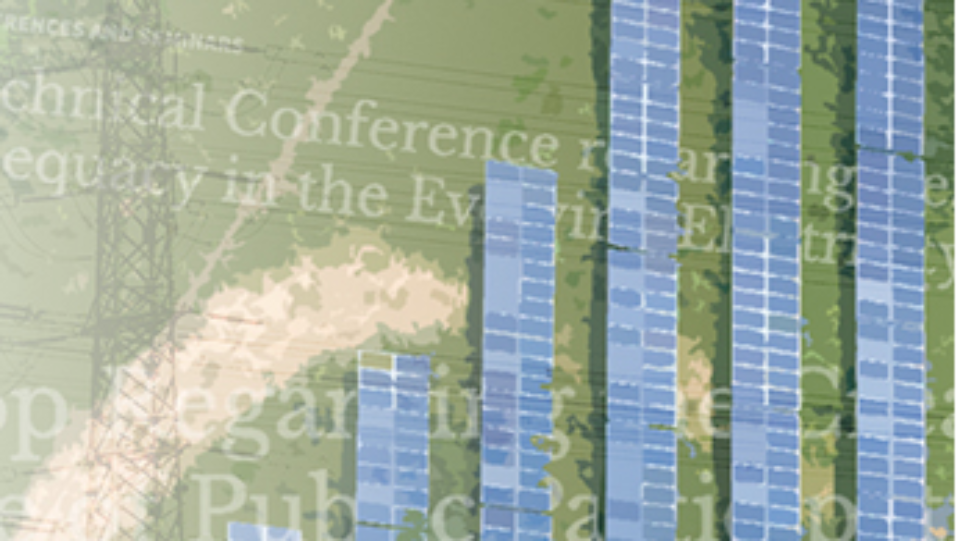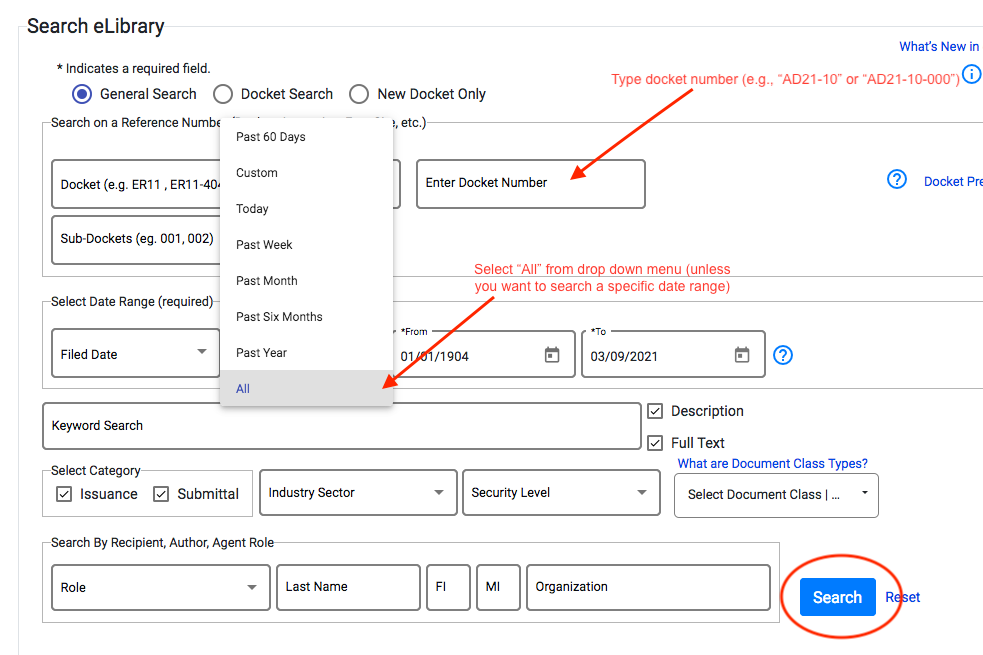Electrifying Your FERC Work
Jessica Bell (Energy Director & Deputy Director) / March 9, 2021

The Federal Energy Regulatory Commission (FERC) is an independent (and fairly obscure) federal agency. And while the agency has not been on the forefront of climate change-related work in the past, the change in administration has brought a pronounced shift at the agency with President Biden’s choice of Richard Glick as chairman. This post summarizes some upcoming proceedings of interest and gives a brief rundown of how to participate.
The terms of the five FERC commissioners are not tied to the presidential administration, but the president can choose a new chair from among the sitting commissioners at any time. The new chair, Glick, has served as a commissioner since November 2017 and has been outspoken about the Commission’s responsibilities around climate change. The chairman still only has one vote -- just like the rest of the commissioners -- but now that Glick is chair he plays a huge part in shaping the Commission’s priorities. And right now, FERC is going in exciting directions that all clean energy advocates need to know about.
FERC has opened a number of proceedings to explore issues crucial to the future of the grid and an electricity system that is reliable, clean, and equitable:
Electric Reliability in the Face of Climate Change
This new proceeding will include a technical conference — sessions where panelists discuss a particular issue and then Commissioners and FERC staff have the opportunity to ask questions -- and the opportunity to submit written comments on the threats that climate change and extreme weather events pose to the grid. Details to come.
**UPDATE: This technical conference is scheduled for June 1 and June 2. Panelist nominations are due April 7. The docket is AD21-13.
**UPDATE: FERC issued a supplemental notice on March 15 that includes specific areas where it is seeking comment. Comments are due April 15.
Resource Adequacy in the Evolving Electricity Sector
FERC will be holding a technical conference on March 23 and March 24 to discuss resource adequacy. Resource adequacy is how a state or region ensures there will be sufficient electric generating resources to meet demand in all but the most extreme of circumstances. This is part of a conference series on market design issues. The docket is AD21-10-000.
**UPDATE: A 3/9/21 supplemental notice has a partial agenda and lists specific pending proceedings that may be discussed at the technical conference.
**UPDATE: A 3/16/21 supplemental notice includes panelists.
**UPDATE: FERC announced a technical conference on resource adequacy in ISO-New England to be held on May 25.
Office of Public Participation
The Office of Public Participation has been in federal law for several decades, but it got a push from legislation at the end of 2020 directing FERC to get the office off the ground. FERC must submit a report to Congress by June 25, 2021, detailing how it will establish and operate the office. Commissioner Allison Clements is leading this effort. FERC will hold a workshop on April 16 to explore what the office should look like, including its function and scope, its organizational structure, and funding for participants. Nominations to speak at the workshop are due March 10. The docket is AD21-9-000.
FERC is also holding a series of listening sessions to solicit feedback from specific stakeholder groups. The sessions will be: Landowners and Communities Affected by Infrastructure Development on March 17; Environmental Justice Communities and Tribal Interests on March 22; Tribal Governments on March 24; and Energy Consumers and Energy Advocates on March 25. FERC advises that preregistration to speak at these sessions is highly recommended.
**UPDATE: A 3/23/21 supplemental notice announces another listening session in the evening on April 19 and establishes a deadline for written comments of April 23.
Electrification and Grid of the Future
FERC will be holding a technical conference on April 29 to discuss how to prepare for a future where consumers use electricity more and more to replace gas and oil, such as for electric vehicles and home heating. Nominations to speak at the technical conference are due March 19. The docket is AD21-12-000.
Resource Adequacy in the Western Interconnection
**UPDATE: On March 16, FERC announced it will hold a technical conference on resource adequacy developments in the Western Interconnection on June 23 and 24.
Certification of New Natural Gas Pipelines
FERC is responsible for considering and approving or denying new interstate natural gas pipelines. FERC currently uses a policy statement from 1999 to guide its approach to these applications, which it grants in the overwhelming majority of cases. In 2018, FERC opened a proceeding to consider revising its policy statement and took comment, but did not finalize any revisions. FERC’s 2018 notice asked for information about (1) its reliance on precedent agreements to demonstrate need for a project; (2) landowner interests and the exercise of eminent domain; (3) its evaluation of alternatives and environmental effects; and (4) the efficiency of its process.
FERC is now refreshing the record. FERC asks a series of specific questions in each of these areas to gather more information on important issues, including whether it should consider the expected use of the gas in determining need and how to determine the significance of a project’s greenhouse gas emissions. FERC is also seeking additional information about how to identify and address disproportionately high and adverse human health or environmental effects on environmental justice communities, as well as potential mitigation strategies. Comments are due April 26. The docket is PL18-1-000.
**UPDATE: FERC extended the comment deadline by 30 days to May 26.
Get Involved
These technical conferences are open to the public, currently via webcast only. Detailed agendas will be released as the event dates approach. If you want to speak, follow the instructions at the links provided above to nominate yourself by the deadline. Even if you do not wish to speak at a technical conference, you can attend to hear what others have to say on the issues and to hear what questions the commissioners ask, which can be indicative of what future actions the Commission might take. There are also opportunities to submit written comments.
FERC will post information about these proceedings on its website and in eLibrary, its document repository. Perform a general search by entering the docket number (you may also need to set the date range to “All,” see screenshots below). You can also eSubscribe to automatically receive new issuances and filings in a docket. Within eSubscription, you can also choose to subscribe to FERC’s press releases. And of course, make sure you’re following the FERC commissioners that are active on Twitter (Glick’s Twitter profile, Clements’ Twitter profile, Chatterjee’s Twitter profile, plus the FERC Twitter account).

This page was updated on January 30, 2024 to better meet our accessibility standards. To see the page as it was initially published, click here.
